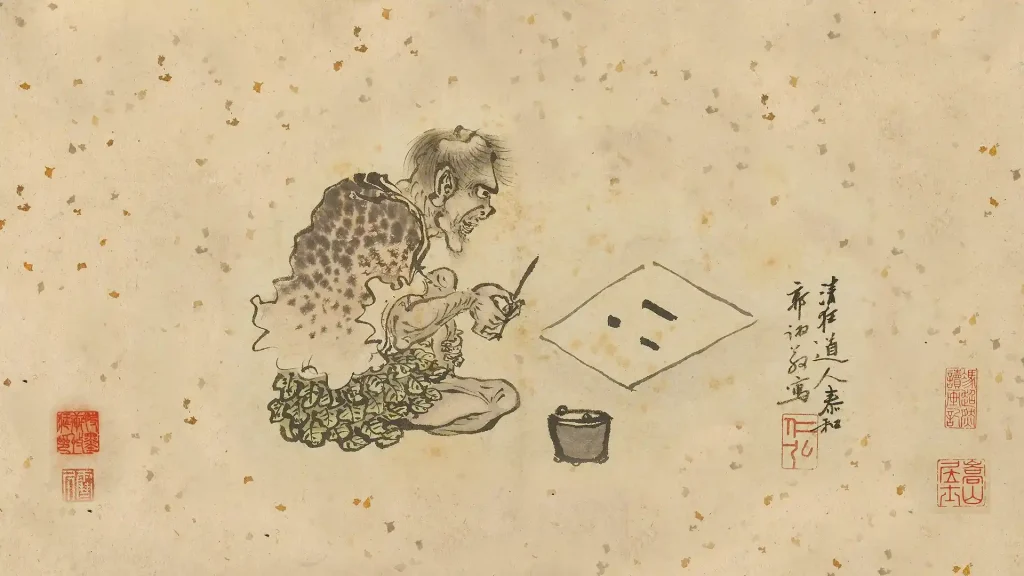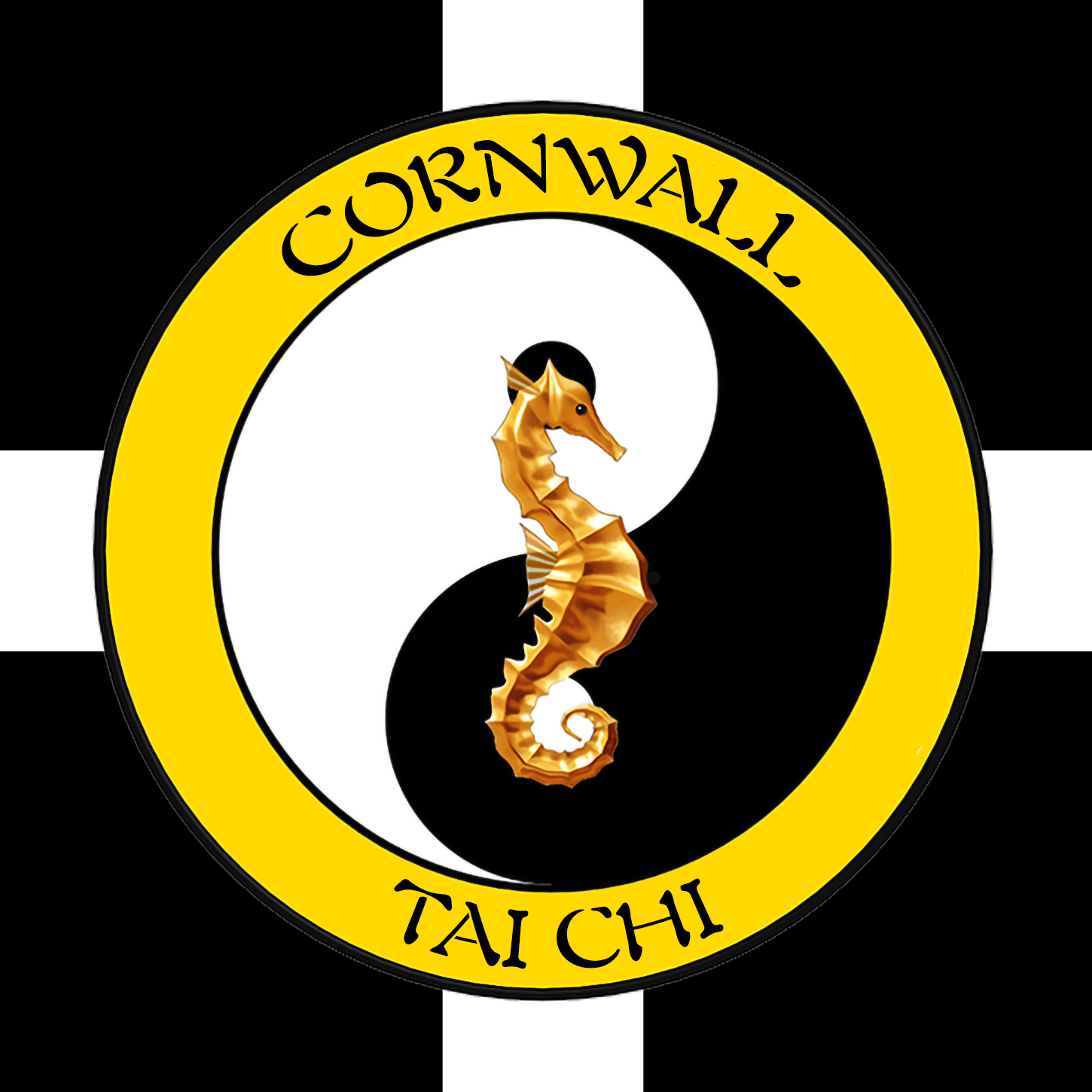
This painting by Ming Dynasty artist Guo Shu depicts Fuxi, a God-like figure from China’s creation myths, holding a twig and studying the Shao Yang diagram he just created, which represents Autumn. Fuxi, who worked in partnership with his sister Nüwa, is shown wearing a coat and skirt made of animal furs and leaves, with dark skin and unusual protuberances on his head, indicating that he existed at the dawn of modern human civilization. These diagrams of broken and unbroken lines were combined as the first stage in the creation of the trigrams which represent natural phenomena such as Earth, Wind, Fire and Water.
Fuxi’s sister Nüwa is an equally important figure in Chinese mythology. Nüwa is often depicted as having the body of a woman and the tail of a serpent, and she is credited with creating modern human beings and repairing the pillars of the sky.
“Repairing the pillars of the sky” 1 is a phrase that is often used metaphorically in Chinese culture to refer to the restoration of stability or order in society or the world at large. The pillars of the sky are thought to represent the stability and balance of the universe, and their repair implies a return to order after a period of chaos or disruption.
In ancient Chinese mythology, there is a story 2 of a hero named Gong Gong who caused the pillars of the sky to break in a fit of anger, resulting in massive floods and disasters. Gong Gong is a water god who is often depicted as having the head of a dragon and the body of a human. He is associated with floods, storms, and chaos. According to the legend, Gong Gong became angry when he lost a battle to the god of fire, Zhurong, and in his rage, he slammed his head into Buzhou Mountain, one of the pillars holding up the sky. The impact caused the mountain to collapse, and the sky tilted to one side, causing great chaos and destruction on Earth.
The subsequent restoration of the pillars by Nüwa, is seen as a metaphorical act of restoring balance and order to the world.
In modern times, the phrase “repairing the pillars of the sky” has been used in various contexts, including politics, economics, and social issues, to suggest the need for restoring stability and harmony to a particular area of society or the world.
According to legend, Emperor Fuxi and his sister Nüwa were the only survivors of a great flood that had devastated the earth. It’s difficult to say for certain about the exact nature of this legend as there are different theories and interpretations regarding the origin and date of the Great Flood. However, some researchers have suggested that the Great Flood could be linked to a catastrophic event that occurred around 12,800 years ago known as the Younger Dryas Impact Hypothesis. This hypothesis proposes that a comet or asteroid impact, or a series of impacts, caused a sudden cooling of the climate and triggered a period of massive environmental changes, including widespread flooding, wildfires, and extinctions of many large animal species. This hypothesis has gained credence more recently with the emergence of new supporting scientific and archaeological evidence which sheds new light on the many well-known mythological flood stories from various cultures around the world.
Fuxi and Nüwa had to rebuild civilization, and in order to do so, they needed to find a way to understand the natural world and its patterns. One day, while observing the cracks on a tortoiseshell, Fuxi had a revelation. He realized that the patterns on the shell could be used to represent the forces of nature and the principles of the universe. He created the eight trigrams based on these patterns and used them to understand the cycles of nature and to predict the future.
The trigrams became the basis of the I Ching, also known as the Book of Changes, which is one of the oldest and most important texts in Chinese philosophy and culture, and the first known instance of a binary code. The I Ching contains a system of divination that uses the trigrams to provide guidance and advice on various aspects of life. Nüwa is sometimes associated with the yin-yang symbol, which is also an important concept in Chinese philosophy and cosmology.
Yuan Shen
Yuan shen (元神) is a term that is commonly used in Taoist philosophy to refer to the original spirit or soul. Every person is born with an innate yuan shen, which is pure, uncorrupted, and full of potential. However, as we go through life, our yuan shen becomes clouded by the influences of society, our environment, and our own negative emotions and thoughts.
The goal of Taoist philosophy and practices like Tai Chi and Qigong is to cultivate and refine the yuan shen, so that it can return to its original state of purity and potential. This is accomplished through practices like meditation, breathwork, and physical exercises like Tai Chi.
The Well
I Ching Hexagram 48, Jing (井) or The Well, represents a deep and inexhaustible source of nourishment and wisdom. The Well symbolizes the ever-present source of sustenance that is available to everyone who seeks it. The six lines of the hexagram form an image of a well, with the water being the source of life and the well’s structure representing the stability and support necessary for drawing water from it.
The connection between cultivating Yuan Shen and the symbolism of The Well can be seen through the shared emphasis on accessing the inner depths of one’s being to draw upon a source of wisdom, nourishment, and growth. Cultivating Yuan Shen requires practitioners to delve into the core of their existence to uncover and develop their inherent spiritual qualities. Similarly, the Well signifies an ever-present source of spiritual nourishment that can be accessed through introspection and self-cultivation.
This idea of returning to the source is central to both cultivating Yuan Shen and The Well. In Taoist traditions, the ultimate goal of spiritual cultivation is to return to the Tao, the source of all existence, by refining and purifying oneself. This process involves letting go of attachments, desires, and worldly distractions, enabling one to merge with the Tao and attain spiritual enlightenment.
In the context of Hexagram 48, returning to the source means continuously drawing from the well of wisdom and nourishment, allowing for constant growth and renewal. By accessing the deep reservoir of spiritual sustenance, one can overcome obstacles, replenish the spirit, and ultimately reconnect with the source of all being.
Alchemy
Taoist alchemy is a set of practices that are rooted in ancient Taoist philosophy and are designed to help practitioners achieve immortality or spiritual enlightenment. One of the key practices of Taoist alchemy is cultivating the yuan shen, which is believed to be the key to unlocking the power of the universe.
The yuan shen can be cultivated through practices like meditation, breathwork, and physical exercises like Tai Chi. These practices help to refine the yuan shen and to bring it into alignment with the universe, allowing practitioners to achieve greater levels of spiritual enlightenment and insight.
Internal medicine
According to Chinese medicine, the yuan shen is closely connected to the heart, which is the organ that governs the spirit and emotions. According to the Huangdi Neijing or Yellow Emperor’s Classic of Internal Medicine, all disease originates in the spirit. This might seem difficult to accept at first but consider how some people have strong immunity and never get sick mentally or physically. The Chinese medicine worldview is based on Taoism which has at its root the inseparable relationship between Yin and Yang. The mind, body, and spirit are really only different aspects of the same thing.
In Chinese medicine, imbalances in the heart can lead to mental and emotional disturbances, as well as physical symptoms like palpitations, insomnia, and anxiety. By cultivating the yuan shen, practitioners can help to balance the heart and promote overall health and well-being.
The Huangdi Neijing conveys an enduring proverb:
“Do not dig a well when you start to feel thirsty.”
This age-old wisdom emphasizes the significance of prevention and readiness, inspiring us to persistently nurture our spirit and face life’s challenges with foresight. Somebody built The Well, a reservoir serving as a constant lifeline, quenching the thirst of villagers, irrigating crops, and providing water for cooking. In the absence of a well, the village could not flourish. Furthermore, The Well’s symbolism is rooted in drawing water from deep within the Earth, representing elements that embody the essence of Yin, the nurturing force of life.
Tai Chi and Yuan Shen
Tai Chi is a physical practice that is designed to cultivate the yuan shen through slow, flowing movements that synchronize with the breath. Tai Chi is often described as “moving meditation,” as practitioners are encouraged to focus their minds on the movements and sensations in their bodies. Tai Chi is more than just a set of movements to be copied but a comprehensive practical study of Taoist philosophy and how to put it into action.
Practitioners can become more aware of their thoughts and emotions, and learn to detach from negative or distracting thoughts. This allows the yuan shen to emerge from the cloud of mental and emotional clutter, and to connect with the body and the present moment.
How to Cultivate Yuan Shen in Tai Chi Practice
In order to cultivate the yuan shen in Tai Chi practice, there are several key principles and techniques to keep in mind:
- Focus on the breath – Tai Chi movements are designed to synchronize with the breath, which helps to calm the mind and cultivate the yuan shen. Breathing is drawing vital energy into the body and purifying the Qi, it’s a direct connection between you and the environment. Its something that you have been doing since you were attached to your mother. In Taoist Five Elements theory the lungs come under the metal element which draws a parallel with the purification needed for making pure metals from base ores. In fact, the metal element used to be called Gold which is incorruptible.
- Pay attention to the present moment – By focusing on the movements and sensations in the body, practitioners can cultivate concentration and awareness of the present moment, which helps to detach from negative thoughts and emotions. Original spirit is about being in the now and letting go of bad habits and not wasting precious energy on worrying about the future.
- Practice regularly – In order to cultivate the yuan shen, it is important to practice Tai Chi regularly and consistently, ideally on a daily basis. With a gradual increase through regular practice, skills are developed slowly and thoroughly with a solid basis. Think about building a fire, it starts with kindling and twigs, and once it’s ablaze then it needs to be tended or the flame will die out and the whole process will have to start from scratch.
- Seek guidance from a qualified instructor – A qualified Tai Chi instructor can help to guide practitioners in cultivating the yuan shen and developing a deeper understanding of Tai Chi practice. A good instructor has moved past simply learning movements to cultivating the essences and principles on which Tai Chi is based and so makes a valuable guide along the path for the beginner. They know what is important and what’s not essential, and can save you wasted time and effort by teaching you the most effective methods.
The concept of yuan shen is an important part of Taoist philosophy, Taoist alchemy, and Chinese medicine principles. In Tai Chi practice, the cultivation of the yuan shen is essential for promoting relaxation, balance, and overall health and well-being.
By practicing Tai Chi regularly and cultivating the yuan shen through techniques like breathwork and meditation, practitioners can develop a deeper connection to the universe and unlock their full potential.
References
- Liezi Chapter 5 “Questions of Tang” (Chinese: 卷第五 湯問篇), Nüwa repairing the original imperfect heaven using five-colored stones, and cutting the legs off a tortoise to use as struts to hold up the sky. https://ctext.org/liezi/tang-wen/zh?en=on#n37468
- Huainanzi: Chapter 1, “Heaven” (天论), section on “The Five Mountains and the Great Flood” (五岳大洪) https://ctext.org/huainanzi/tian-wen-xun#n3056

